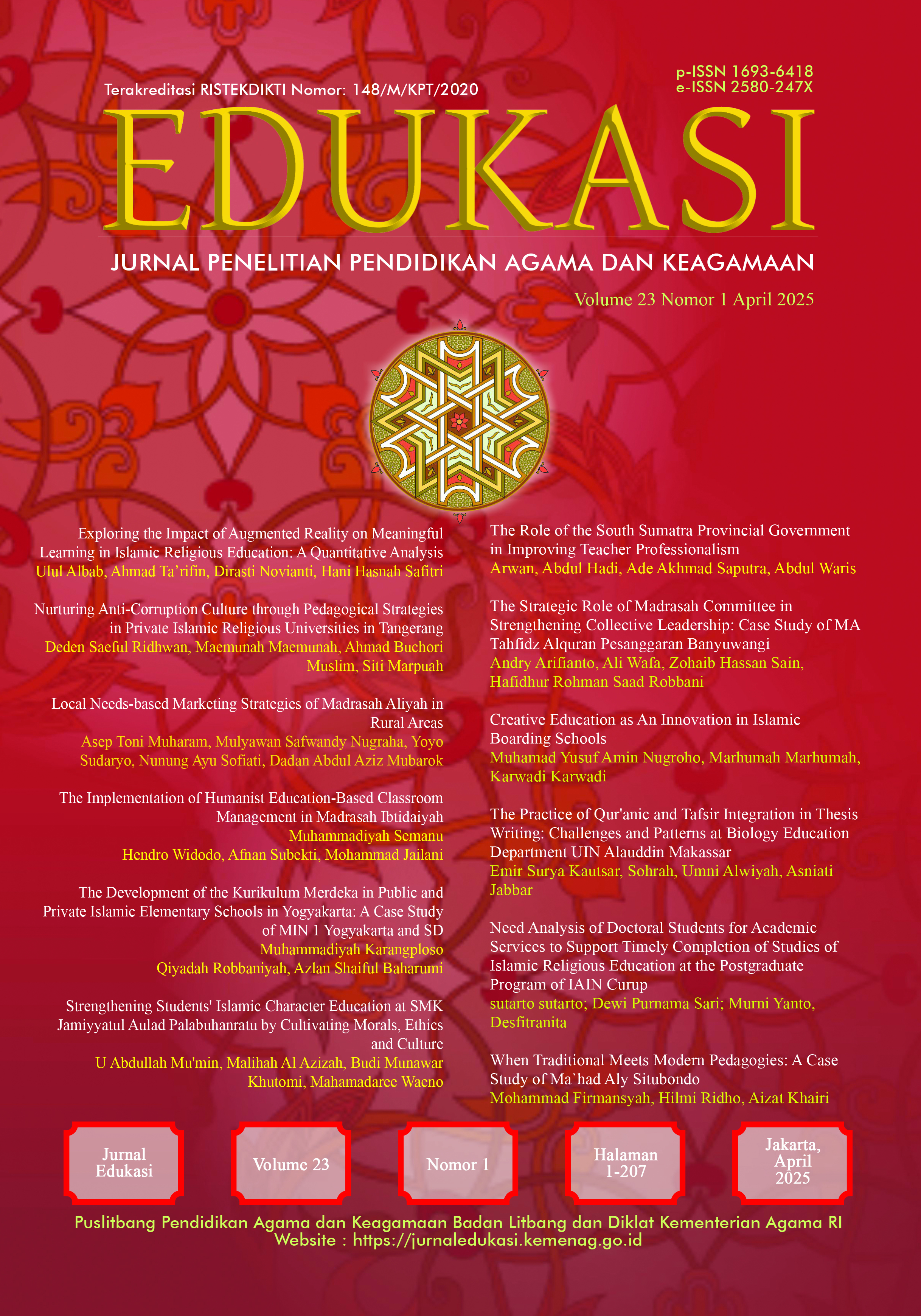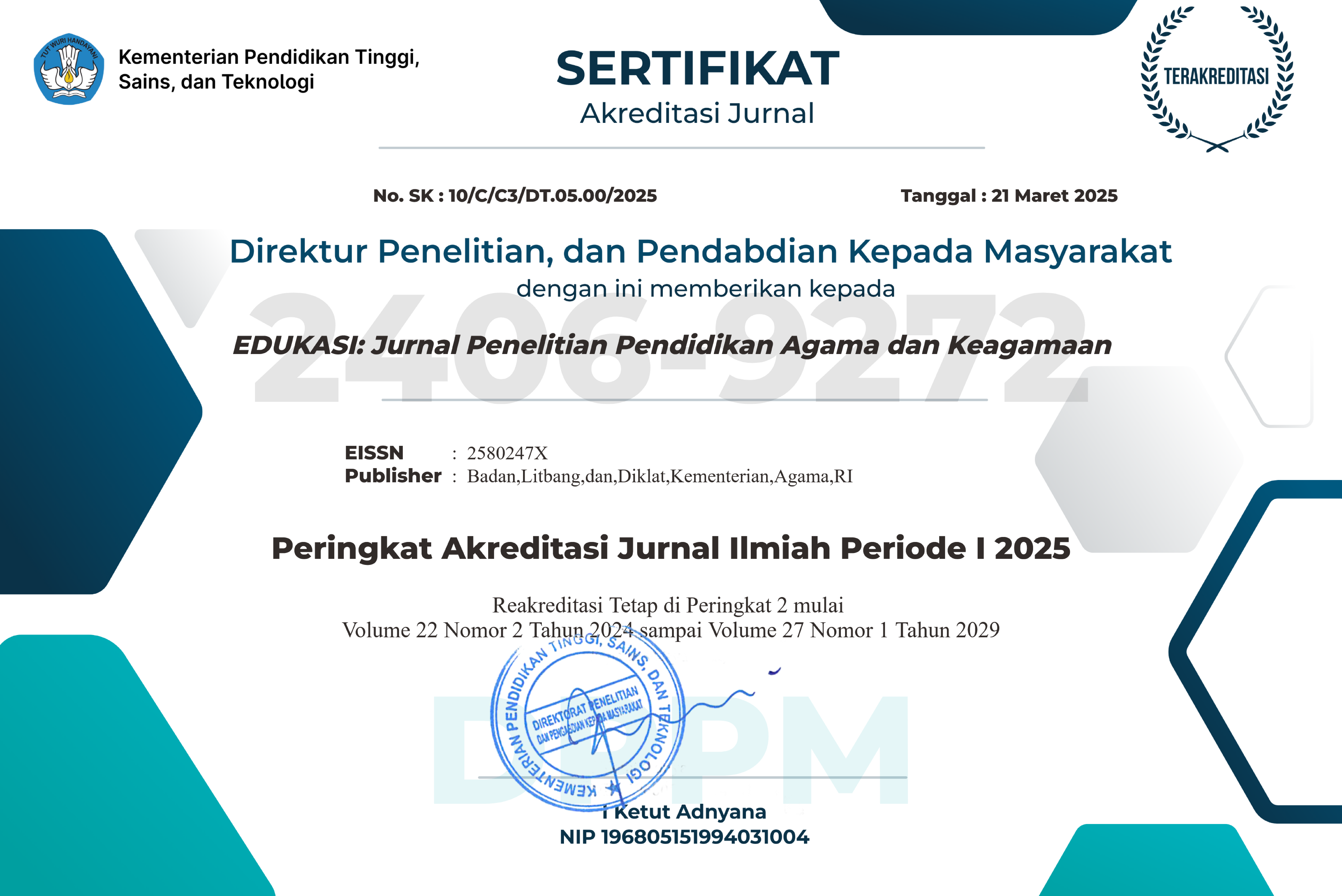Local Needs-based Marketing Strategies of Madrasah Aliyah in Rural Areas
DOI:
https://doi.org/10.32729/edukasi.v23i1.2174Keywords:
local needs, marketing strategies, Islamic high school, rural areaAbstract
This study investigates the implementation of local-needs-based marketing strategies at MA Al-Wasilah Lil Hasanah, a Madrasah Aliyah in Warungkiara, Sukabumi, West Java, Indonesia, where educational access is often constrained in rural areas. Employing a qualitative case study approach, data were collected through in-depth interviews, participatory observations, and document analysis. The findings demonstrate that a hybrid marketing model, integrating community-based engagement with digital strategies, significantly enhances student enrollment and community trust. Traditional methods, such as religious gatherings and social events, foster strong local connections, while digital marketing, despite infrastructural challenges, broadens outreach. By aligning strategies with socio-cultural values, the madrasah strengthens its sustainability and public confidence. This research offers practical insights for optimizing marketing in Islamic schools and highlights the potential of hybrid models for global Islamic educational institutions facing similar challenges. Further studies are recommended to explore the long-term efficacy of digital marketing in rural education settings.
Downloads
References
Afriwanti, A., & Pasrizal, P. (2021). Marketing strategy for education services in integrated Islamic schools. Jurnal Pendidikan Islam, 6(1), 34–45. https://doi.org/10.14421/jpi.2021.61.34-45
Aimah, S., Mufidah, N., & Ifadah, M. (2024). Digital marketing and community engagement: Strategies for enhancing competitiveness in Islamic schools. Journal of Islamic Education Marketing, 15(1), 89–104. https://doi.org/10.33422/jiem.v15i1.123
Birt, L., et al. (2016). Member checking: A tool to enhance trustworthiness or merely a nod to validation? Qualitative Health Research, 26(13), 1802–1811. https://doi.org/10.1177/1049732316654870
Braun, V., & Clarke, V. (2006). Using thematic analysis in psychology. Qualitative Research in Psychology, 3(2), 77–101. https://doi.org/10.1191/1478088706qp063oa
Chotimah, H., & Akrom, M. (2024). Digital marketing in Islamic education: Opportunities and challenges in building institutional image. Islamic Management: Jurnal Manajemen Pendidikan Islam, 7(1), 45–60. https://doi.org/10.30868/im.v7i1.789
Creswell, J. W., & Poth, C. N. (2018). Qualitative inquiry and research design: Choosing among five approaches (4th ed.). Sage.
Denzin, N. K. (2017). The research act: A theoretical introduction to sociological methods. Routledge.
Farwati, R. (2024). Hybrid marketing strategies in Islamic schools: A case study of rural Indonesia. Journal of Islamic Education Marketing, 12(3), 45–60. https://doi.org/10.33422/jiem.v12i3.789
Firdaus, A. (2023). WhatsApp-based communication in Islamic education: Enhancing parental engagement. Jurnal Pendidikan Agama Islam, 20(2), 123–138. https://doi.org/10.14421/jpai.2023.202.456
Handayani, N. A., & Saadah, N. (2019). The 7P marketing mix in Islamic schools: A strategy for competitiveness. Jurnal Manajemen Pendidikan Islam, 5(2), 78–90. https://doi.org/10.14421/jmpi.2019.52.78-90
Handoyo, M., Nurdyansyah, N., & Haryanto, B. (2020). Marketing strategy of new schools in the selection of new students at Al Zamzam Sukodono Islamic Elementary School. Proceedings of the ICECRS, 8, 367–375. https://doi.org/10.21070/icecrs2020367
Haris, A. (2024). Integrating digital and traditional marketing strategies for rural Islamic schools. Journal of Educational Development, 10(1), 33–48. https://doi.org/10.3390/jed.v10i1.234
Hassan, M., & Ali, A. (2022). Global perspectives on Islamic education: Adapting local marketing strategies for international competitiveness. Journal of Islamic Educational Research, 7(4), 89–104.
Hayani, R., Susilo, A., & Pratama, R. (2023). Life skills-based curriculum in Islamic education: A model for rural madrasahs. Journal of Education and Islamic Studies, 9(1), 56–70. https://doi.org/10.3390/jeis.v9i1.123
Ibadiyah, A., Hermawan, A., & Mukhlis, I. (2022). Marketing mix strategy (7P) for Islamic boarding school-based school marketing. International Journal of Humanities Education and Social Sciences (IJHESS), 2(1), 180–189. https://doi.org/10.55227/ijhess.v2i1.222
IstiAmalia, N., Huda, M., Safriani, A., Luebaesa, M., Ibrahim, M., Huda, A., Safriani, M., & Lestari, L. (2023). Implementing the 7P marketing mix in Islamic education: Insights from Phatnawitya School, Thailand. MANAGERIA: Jurnal Manajemen Pendidikan Islam, 8(2), 12–28. https://doi.org/10.14421/manageria.2023.82-02
Khan, M. N. (2022). Digital divide and its impact on educational marketing in rural areas. Journal of International Consumer Marketing, 34(2), 89–104. https://doi.org/10.1080/08961530.2021.1987654
Khasanah, A., Putra, R., & Santoso, B. (2023). Islamic values-based character education in shaping resilient student personalities. International Journal of Islamic Studies, 15(1), 45–60. https://doi.org/10.3390/ijis.v15i1.789
Kurniawan, A., Susilo, A., & Pratama, R. (2023). Challenges of digital marketing in rural Islamic schools: Limited internet access and infrastructure. Journal of Educational Development, 9(2), 112–128. https://doi.org/10.3390/jed.v9i2.456
Kurniawan, R. (2020). Limitations of community-based marketing in rural Islamic schools: A case study in Indonesia. Jurnal Pendidikan Islam, 5(2), 123–135.
Lestari, A., & Hidayat, R. (2021). Challenges in training madrasah administrators for effective educational management. Indonesian Journal of Educational Management, 3(1), 45–58.
Lincoln, Y. S., & Guba, E. G. (1985). Naturalistic inquiry. Sage.
Maulana, F., & Fitri, N. (2023). Hybrid marketing strategies for Islamic schools: Integrating community engagement and digital platforms. Journal of Islamic Education Marketing, 14(2), 67–82.
Mr, A., Rahmah, N., & Zainuddin, F. (2024). Community-based education in Islamic tradition: Historical roots and modern applications. Journal of Community-Based Education, 7(1), 22–36. https://doi.org/10.30868/jcbe.v7i1.789
Mujib, A. (2021). Competency-based curriculum model for Islamic education in rural areas. Jurnal Pendidikan Islam, 10(2), 89–104. https://doi.org/10.14421/jpi.2021.102.89-104
Mutakin, T., Tihami, M., & Nugraha, M. S. (2024). Marketing management strategies of Islamic education institutions in increasing competitiveness. Jurnal Manajemen Pendidikan Islam, 10(1), 23–37. https://doi.org/10.14421/jmpi.2024.101.23-37
Nadila, A., & Ritonga, M. (2023). Islamic values-based communication strategies in madrasah marketing. Journal of Islamic Education Marketing, 14(2), 56–70. https://doi.org/10.33422/jiem.v14i2.234
Nugroho, D., & Santoso, B. (2022). Competitive dynamics between madrasahs and secular schools in rural Indonesia. Journal of Educational Studies, 10(3), 201–215.
Palinkas, L. A., et al. (2015). Purposeful sampling for qualitative data collection and analysis in mixed method implementation research. Administration and Policy in Mental Health, 42(5), 533–544. https://doi.org/10.1007/s10488-013-0528-y
Pujianto, A., & Muzdalifah, M. (2022). Digital marketing in Islamic educational institutions: Aligning with Islamic ethical principles. Islamic Management: Jurnal Manajemen Pendidikan Islam, 5(2), 89–104. https://doi.org/10.30868/im.v5i2.567
Rahmatullah, M. (2022). Integrating modern skills in Islamic education: A response to global workforce demands. International Journal of Islamic Studies, 14(1), 33–47.
Ramdane, T., & Merah, S. (2020). Islamic education curriculum for global competitiveness: A model for madrasahs. International Journal of Islamic Studies, 12(1), 33–48. https://doi.org/10.3390/ijis.v12i1.123
Rizqon, M., & Fimaisarah, N. (2024). Hybrid marketing strategies for Islamic schools: Combining online and offline approaches. Journal of Islamic Education Marketing, 15(2), 78–92. https://doi.org/10.33422/jiem.v15i2.456
Rubino, M., Santoso, B., & Rahmah, N. (2023). Islamic values-based communication in building school-community relationships. Journal of Community-Based Education, 6(2), 45–60. https://doi.org/10.30868/jcbe.v6i2.234
Safitri, N. (2024). Innovative marketing strategies for the transformation of Islamic education. International Journal of Marketing and Islamic Business, 1(1), 56–70. https://doi.org/10.33422/ijmib.v1i1.56
Sajirun, M., & Syah, L. (2020). Integrated Islamic school marketing strategies through the internet in 4.0 era. Digital Islamic Journal of Economics, Management, and Social Sciences, 1(5), 344–358. https://doi.org/10.31933/DIJEMSS.V1I5.344
Santika, R. (2023). Resource constraints and declining enrollment in rural madrasahs: A quantitative analysis. Journal of Educational Development, 9(2), 88–102.
Sari, N., et al. (2023). The importance of localized marketing strategies in enhancing Islamic school enrollment. Journal of Community-Based Education, 6(1), 15–29.
Saunders, B., et al. (2018). Saturation in qualitative research: Exploring its conceptualization and operationalization. Quality & Quantity, 52(4), 1893–1907. https://doi.org/10.1007/s11135-017-0574-8
Setyaningsih, N., Putra, R., & Santoso, B. (2019). Integrating traditional and digital communication strategies in Islamic schools. Jurnal Pendidikan Islam, 8(1), 56–70. https://doi.org/10.14421/jpi.2019.81.56-70
Wicaksono, A., Susilo, A., & Pratama, R. (2022). Promotional videos in Islamic school marketing: Enhancing institutional appeal. Journal of Islamic Education Marketing, 13(1), 45
Widodo, H., & Pratama, A. (2021). Resource Challenges and Student Enrollment Decline in Indonesian Rural Madrasahs. Jurnal Manajemen Pendidikan Islam, 7(2), 76–90.
Yin, R. K. (2018). Case study research and applications: Design and methods (6th ed.). Sage.
Yudianto, F., Herlambang, T., Adinugroho, M., Anshori, M. Y., Kurniastuti, I., & Rizqina, R. (2023). Enhancing e-marketing competence of Islamic boarding school students: A case study of Al Muin Syarif Hidayatullah. Indonesian Journal of Cultural and Community Development, 14(2), 1–10. https://doi.org/10.21070/ijccd.v14i2.884
Zainuddin, F., et al. (2023). Modern Skill Integration in Madrasah Curricula: Preparing Students for the Digital Era. Journal of Curriculum and Instruction, 11(3), 112–128.
Downloads
Published
Issue
Section
License
Copyright (c) 2025 Asep Toni Muharam, Mulyawan Safwandy Nugraha, Yoyo Sudaryo, Nunung Ayu Sofiati, Dadan Abdul Aziz Mubarok

This work is licensed under a Creative Commons Attribution-ShareAlike 4.0 International License.









